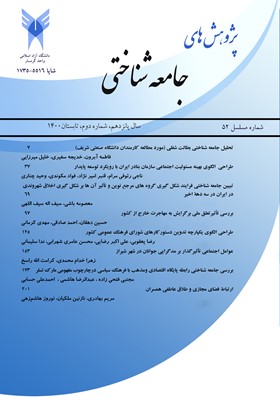طراحی الگوی بهینه مسئولیت اجتماعی سازمان بنادر ایران با رویکرد توسعه پایدار
محورهای موضوعی : در این فصلنامه موضوعات جامعه شناختی در اولویت چاپ هستند و موضوعات نزدیک به جامعه شناسی در اولویتهای بعد قرار می گیرندناجی رئوفی مرام 1 , قنبر امیرنژاد 2 , فؤاد مکوندی 3 , وحید چناری 4
1 - دانشجوی دکترا ،گروه مدیریت دولتی، واحد شوشتر، دانشگاه آزاد اسلامی، شوشتر، ایران.
2 - دانشیار، گروه مدیریت دولتی، واحد تهران جنوب، دانشگاه آزاد اسلامی، تهران، ایران
3 - استاد یار، گروه مدیریت دولتی، واحد شوشتر، دانشگاه آزاد اسلامی، شوشتر، ایران.
4 - استاد یار، گروه مدیریت دولتی، واحد شوشتر، دانشگاه آزاد اسلامی، شوشتر، ایران.
کلید واژه:
چکیده مقاله :
هدف از پژوهش حاضر طراحی و تبیین الگوی بهینه مسئولیت اجتماعی سازمان بنادر ایران با رویکرد توسعه پایدار بوده است. تحقیق حاضر از لحاظ هدف، از نوع تحقیقات کاربردی و از نظر نوع روش، روش تحقیق آمیخته محسوب می گردد. روش تحلیل دادهها در بخش کیفی پژوهش با توجّه به اهداف و سؤالهای پژوهش از روش نظریّه پردازی داده بنیاد استفاده شده است. روش گردآوری داده ها در بخش کیفی اغلب مصاحبه می باشد. جامعه آماری در مرحله کیفی، شامل خبرگان دانشگاهی و مدیرانی که دارای تحصیلات عالی و با مسئولیت اجتماعی آشنایی کامل دارند، بوده است و تعداد ده نفر به عنوان نمونه انتخاب شدند. نمونهگیری تا زمانی ادامه پیدا میکند که فرایند اکتشاف به نقطه اشباع نظری برسد. جامعه آماری پژوهش در مرحله کمی، شامل کلیه کارکنان سازمان بنادر و دریانوردی بوده است. تعداد 166 نفر به روش نمونه گیری تصادفی طبقهای بر اساس رده سازمانی از بین کلیه کارکنان انتخاب گردید. برای گردآوری داده ها در بخش کمی از پرسش نامه محقق ساخته با 72 گویه استفاده و جهت تجزیه و تحلیل داده ها از آمار توصیفی و آمار استنباطی بر اساس روش حداقل مربعات جزئی و نرم افزار SMART PLS استفاده شد. انجام کدگذاری های سه گانه باز، محوری و انتخابی، منجر به شکل گیری 150 کد مفهوم انتزاعی و 22 مقوله کلی شد. بر اساس نتایج بدست آمده از مدل نهایی، عوامل مداخله گر تاثیر منفی و معناداری بر راهبردها دارد؛ در حالی که تاثیر شرایط علی بر راهبردها مثبت و معنیدار بوده است. همچنین شرایط زمینه ای اثر مثبت و معناداری بر راهبردها دارد و همچنین راهبردها نیز اثر مثبت و معناداری بر پیامدها دارد.
Naji Raufi Maram PhD Student, Department of Public Administration, Shushtar Branch, Islamic Azad University, Shushtar, Iran. Ghanbar Amirnejad Associate Professor, Department of Public Administration, South Tehran Branch, Islamic Azad University, Tehran, Iran (Corresponding Author).Email: gh.amirnejad@iaushoshtar.ac.ir Fouad Makoundi Assistant Professor, Department of Public Administration, Shushtar Branch, Islamic Azad University, Shushtar, Iran. Vahid Chenari Assistant Professor, Department of Public Administration, Shushtar Branch, Islamic Azad University, Shushtar, Iran The purpose of this study was to design and explain the optimal social responsibility model of the Iranian Ports Organization with a sustainable development approach. The present study is applied research in terms of purpose and a mixed research method in terms of method. Data analysis method in the qualitative part of the research, according to the goals and questions of the research, the data theorizing method of the foundation has been used. The method of data collection in the qualitative part is often interview. The statistical population in the qualitative stage included academic experts and managers with higher education and full familiarity with social responsibility, and ten people were selected as a sample. Sampling continues until the exploration process reaches a theoretical saturation point. The statistical population of the research in a quantitative stage, included all employees of the Ports and Maritime Organization. 166 people were selected from all employees by stratified random sampling based on organizational category. To collect data in a small part, a researcher-made questionnaire with 72 items was used and to analyze the data, descriptive statistics and inferential statistics based on partial least squares method and SMART PLS software were used. Open, axial and selective triple coding led to the formation of 150 abstract concept codes and 22 general categories. Based on the results obtained from the final model, intervening factors have a negative and significant effect on strategies; While the effect of causal conditions on strategies has been positive and significant. Also, background conditions have a positive and significant effect on strategies and also strategies have a positive and significant effect on outcomes.
_||_


